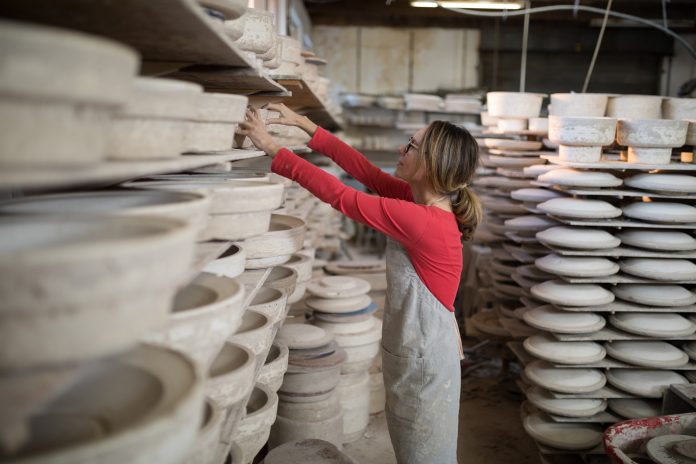Key Takeaways

- Financial Independence: Starting a craft business can lead to financial freedom by selling unique handmade products online, with opportunities to scale income through increasing demand.
- Creative Expression: Running a craft business allows for personal creativity, enabling you to create and share unique products that reflect your style and passion.
- Identify Your Niche: Success starts with pinpointing your niche. Understanding your strengths and market trends helps in creating products that meet customer needs.
- Create a Business Plan: A well-structured business plan outlines your goals, target audience, pricing strategies, and marketing approaches, acting as a roadmap for your venture.
- Legal Compliance: Register your business and comply with local regulations, including necessary permits and insurance, to ensure a legally sound operation.
- Build an Online Presence: Establishing a strong online presence through a professional website and social media is crucial for attracting customers and building brand recognition.
Have you ever dreamed of turning your passion for crafting into a thriving business? Starting a craft business not only allows you to unleash your creativity but also offers the potential for financial independence. With the rise of online marketplaces and social media, there’s never been a better time to dive into the world of handmade goods.
Whether you’re a seasoned artisan or just starting out, launching your own craft business can be an exciting journey. You’ll discover the joys of sharing your creations with others while navigating the challenges of entrepreneurship. From finding your niche to marketing your products, this guide will help you take the first steps toward making your craft dreams a reality.
Benefits Of Starting A Craft Business

Starting a craft business offers unique advantages that promote personal growth and financial stability. Engaging in a craft not only fuels your passion but also creates opportunities for success.
Financial Independence
Achieving financial independence becomes feasible through a craft business. Selling handmade products on platforms like Etsy opens access to a vast audience. You can set competitive prices that reflect the quality and uniqueness of your items. As demand grows, scaling your small business benefits your income. Moreover, managing your own craft business allows you to control costs and expenses, enhancing profitability in the long run.
Creative Expression
Running a craft business provides an outlet for creative expression. You can explore and refine your DIY skills while creating unique products that reflect your personal style. This creative freedom not only brings enjoyment but also captures the attention of customers who appreciate individuality in handmade items. Expressing yourself through various crafts, whether it be jewelry-making, woodworking, or painting, fosters innovation, ensuring your small business stands out in the marketplace.
Essential Steps To Start Your Craft Business

Starting your craft business involves several essential steps. These steps guide you in building a foundation for your handmade products, ensuring success in a competitive market.
Identifying Your Niche
Identify your niche to create unique handmade products. Reflect on your strengths and interests. Focus on what you love making and what you excel at. Conduct market analysis to understand trends on platforms like Etsy. Analyze competitor offerings, pricing strategies, and customer feedback. This helps pinpoint gaps in the craft market and reveals opportunities for your creations.
Creating A Business Plan
Create a business plan to outline your craft business objectives and strategies. Define your target audience and understand their needs. Establish pricing for your handmade products, ensuring coverage of costs while remaining competitive. Include marketing strategies to promote your craft on social media and online marketplaces. A well-structured business plan serves as a roadmap for your small business journey, aligning your goals with actionable steps.
Setting Up Your Craft Business

Setting up your craft business involves several essential steps that lay the groundwork for success. This section highlights key areas to focus on, ensuring you navigate the process effectively.
Legal Requirements
Register your craft business to comply with legal regulations. Obtain any necessary permits and licenses based on your state or local laws. This might include a sales tax permit if you’re selling on platforms like Etsy. Consider insurance coverage to protect your business from potential risks. Research zoning laws if you plan to operate from home, ensuring your space meets regulations for a small business.
Choosing The Right Location
Select a location that aligns with your craft business goals. Consider both online and physical spaces. For online sales, optimize your presence on marketplaces like Etsy, where you can reach a wider audience. If you choose a physical location, assess foot traffic and target demographic. A craft studio or store in a creative community can boost visibility and attract customers who appreciate handmade products. Prioritize a location that reflects your brand and makes a statement about your DIY identity.
Marketing Your Craft Business

Effective marketing and a strong online presence drive the success of your craft business. Focusing on these elements helps you reach potential customers and build brand recognition.
Building An Online Presence
Establishing an online presence is vital for attracting customers to your craft business. Create a professional website to showcase your handmade products, including detailed product descriptions, high-quality images, and easy navigation. Utilize platforms like Etsy to tap into existing audiences familiar with purchasing handmade items. Optimize your website for search engines by incorporating relevant keywords to improve your visibility. Consider setting up an email list to keep customers informed about new products and promotions, ensuring consistent engagement with your audience.
Leveraging Social Media
Leveraging social media enhances your visibility as a craft entrepreneur. Choose platforms that align with your target audience, such as Instagram for visually appealing crafts or Facebook for community engagement. Regularly post content showcasing your DIY process, behind-the-scenes glimpses, and finished products. Encourage customer interaction through polls, contests, and user-generated content, fostering a sense of community around your brand. Collaborate with influencers in the craft space to expand your reach and attract new customers.
Conclusion

Starting a craft business is an empowering journey that allows you to blend creativity with entrepreneurship. By tapping into your unique skills and passions, you can create products that resonate with customers seeking individuality. As you navigate the steps of establishing your business and marketing your creations, remember that persistence and adaptability are key.
Embrace the challenges and celebrate your successes along the way. With a solid plan and a strong online presence, you can carve out your niche in the craft market. The potential for financial independence and personal fulfillment awaits you. Now’s the time to turn your crafting passion into a thriving business.
Frequently Asked Questions

What is a craft business?
A craft business involves creating and selling handmade products, allowing individuals to turn their crafting passion into a source of income. It includes various activities such as designing, producing, and marketing unique items.
How can I start a craft business?
Begin by identifying your unique selling point or niche based on your skills and interests. Conduct market research to understand customer preferences and trends. Create a detailed business plan outlining your objectives, target audience, pricing strategies, and marketing approaches.
What platforms can I use to sell my crafts?
You can sell crafts through online marketplaces like Etsy, eBay, or Amazon Handmade. Additionally, consider setting up your own website to showcase and sell your products, as well as leveraging social media platforms to reach potential customers.
Do I need a business license to start a craft business?
Yes, most regions require a business license to operate legally. It’s essential to check local regulations, obtain necessary permits, and consider any additional requirements like sales tax registration, depending on your business location.
How can I market my craft business effectively?
Utilize social media to showcase your products and engage with your audience. Create valuable content, collaborate with influencers, and utilize email marketing. Building a strong online presence through a professional website can also enhance visibility and attract customers.
What are the financial benefits of starting a craft business?
Running a craft business can lead to financial independence by allowing you to set your own prices and manage costs. As demand grows, you can increase profitability and turn your passion into a sustainable income source.
Can beginners succeed in a craft business?
Absolutely! Whether you’re an experienced crafter or a beginner, success in a craft business is achievable. Focus on finding your niche, continuously improving your skills, and effectively marketing your products to attract customers.
Image Via Envato



